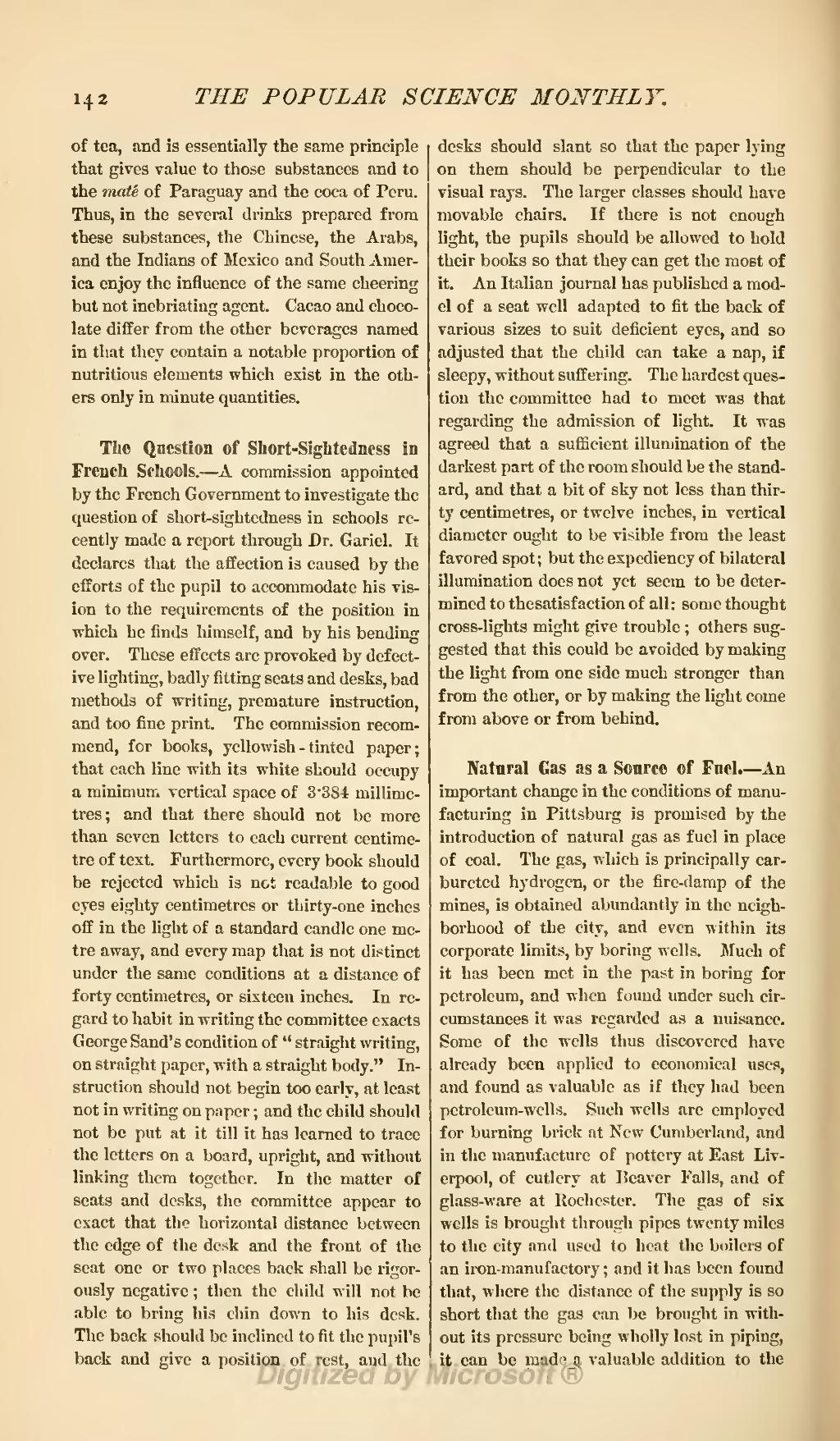of tea, and is essentially the same principle that gives value to those substances and to the maté of Paraguay and the coca of Peru. Thus, in the several drinks prepared from these substances, the Chinese, the Arabs, and the Indians of Mexico and South America enjoy the influence of the same cheering but not inebriating agent. Cacao and chocolate differ from the other beverages named in that they contain a notable proportion of nutritious elements which exist in the others only in minute quantities.
The Question of Short-Sightedness in French Schools.—A commission appointed by the French Government to investigate the question of short-sightedness in schools recently made a report through Dr. Gariel. It declares that the affection is caused by the efforts of the pupil to accommodate his vision to the requirements of the position in which he finds himself, and by his bending over. These effects are provoked by defective lighting, badly fitting seats and desks, bad methods of writing, premature instruction, and too fine print. The commission recommend, for books, yellowish-tinted paper; that each line with its white should occupy a minimum vertical space of 3·384 millimetres; and that there should not be more than seven letters to each current centimetre of text. Furthermore, every book should be rejected which is not readable to good eyes eighty centimetres or thirty-one inches off in the fight of a standard candle one metre away, and every map that is not distinct under the same conditions at a distance of forty centimetres, or sixteen inches. In regard to habit in writing the committee exacts George Sand's condition of "straight writing, on straight paper, with a straight body." Instruction should not begin too early, at least not in writing on paper; and the child should not be put at it till it has learned to trace the letters on a board, upright, and without linking them together. In the matter of seats and desks, the committee appear to exact that the horizontal distance between the edge of the desk and the front of the seat one or two places back shall be rigorously negative; then the child will not be able to bring his chin down to his desk. The back should be inclined to fit the pupil's back and give a position of rest, and the desks should slant so that the paper lying on them should be perpendicular to the visual rays. The larger classes should have movable chairs. If there is not enough light, the pupils should be allowed to hold their books so that they can get the most of it. An Italian journal has published a model of a seat well adapted to fit the back of various sizes to suit deficient eyes, and so adjusted that the child can take a nap, if sleepy, without suffering. The hardest question the committee had to meet was that regarding the admission of light. It was agreed that a sufficient illumination of the darkest part of the room should be the standard, and that a bit of sky not less than thirty centimetres, or twelve inches, in vertical diameter ought to be visible from the least favored spot; but the expediency of bilateral illumination does not yet seem to be determined to the satisfaction of all: some thought cross-lights might give trouble; others suggested that this could be avoided by making the light from one side much stronger than from the other, or by making the light come from above or from behind.
Natural Gas as a Source of Fuel.—An important change in the conditions of manufacturing in Pittsburg is promised by the introduction of natural gas as fuel in place of coal. The gas, which is principally carbureted hydrogen, or the fire-damp of the mines, is obtained abundantly in the neighborhood of the city, and even within its corporate limits, by boring wells. Much of it has been met in the past in boring for petroleum, and when found under such circumstances it was regarded as a nuisance. Some of the wells thus discovered have already been applied to economical uses, and found as valuable as if they had been petroleum-wells. Such wells are employed for burning brick at New Cumberland, and in the manufacture of pottery at East Liverpool, of cutlery at Beaver Falls, and of glass-ware at Rochester. The gas of six wells is brought through pipes twenty miles to the city and used to heat the boilers of an iron-manufactory; and it has been found that, where the distance of the supply is so short that the gas can be brought in without its pressure being wholly lost in piping, it can be made a valuable addition to the

